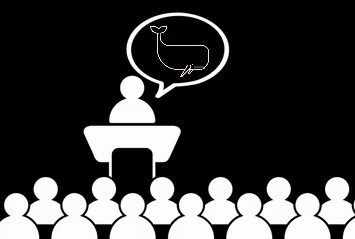What’s the Point?
By Anthony Casperson
8-24-24
The speaker began his words with what he said was the story of Jonah. And I’ll admit, there were a number of events from the book in his summary. The command to go to Nineveh. The boat ride that ended up with the prophet thrown overboard and in the belly of a creature. Jonah eventually going to Nineveh and speaking there. And the Ninevites repenting.
But the further that this speaker went along, the more I questioned if he’d ever actually read the biblical account. And by the time he reached the main point of his speech, I realized why.
The speaker’s point to those listening was, “Good people must not be silenced.” Basically, if we realize that something needs to be called out, then we should speak, lest we find ourselves in a place that’s worse than the death we fear—whether literal of figurative.
It’s because of this purpose from the speaker that he calls Jonah an “every man.” Someone that could be any one of us, given similar circumstances. He made a point to emphasize that we don’t receive much information about Jonah at all. The book doesn’t list out where he’s from, or any other biographical information.
But if we look at the actual first verse of the book, we see that at least the description of “the son of Amittai” is given. This information would be enough for those from ancient Israel to know who he was. Because he played a significant part in Israelite history during the time of Jeroboam II in 2 Kings 14:25.
Thus, the lack of introduction to Jonah’s background in the book he wrote would be similar to how a celebrity writing their autobiography would have little need to belabor their history when that’s not the point of their writing. I mean, most anyone picking up the book when it’s hot off the presses would already know quite a bit about the person who wrote it.
However, since the speaker I heard wanted to invite us all to consider ourselves in the shoes of Jonah, he neglected any of that and blindly emphasized the lack of biography as an invitation for us to place ourselves in Jonah’s shoes. All so that the speaker’s point for his audience made perfect sense—regardless of what the point to the book’s original audience was.
An even worse example of the speaker’s point superceding the original point of the book came when the speaker said that it was on account of the passionate words of Jonah that the Ninevites came to repent. I don’t know how anyone can look at that terrible example of a sermon—five measly words in the Hebrew—and say that they were spoken in any manner other than reluctance.
But if—as was the speaker’s desire—a person wants to call us to speak out with everything we have so that others might come to realize the truth of our words, then a little bit of passion in our voice would be useful. To show Jonah speaking in any other way would be opposed to his point, so of course, it has to be the passionate preaching of this prophet that gets the job done.
Yet that thought utterly betrays the point of Jonah’s writing.
And that betrayal was proven all the more when the speaker ended his abuse of Jonah’s story there. Without even a hint of Jonah 4 in the summary. Or the less-than-resolved ending of the book, which leaves off with the prophet sulking because God did things his own way instead of what the prophet actually desired. God gave forgiveness to repentant people instead of destroying those who were outside of the family of Israel.
This speaker who used Jonah’s story as his intro did the very thing that far too many preachers do with the word of God. And what many of us do with it too.
Our tendency is to approach the bible with a desired direction. A point that we want to make, or a problem that we want fixed. And then try to find a verse or passage that kinda says something about it. We seek a biblical verse to prove our point, even if we have to mangle God’s words in order to make that point.
Any perspective—even opposing ones—can be proven by some bible text, if we just don’t care about a little thing called context. Or logical consistency with any other part of the bible.
If we’re so set on declaring what we want to say instead of letting God’s word show us what it is that we should say.
Whenever we go with the intent to prove our point, we will always find it in someone’s words or actions. It’s called confirmation bias. And this often comes at the cost of mangling the truth to prove our point. A point that’s less than true because of that original intent.
It’s much better for us to come to the bible asking, “What does this passage want to say to me?” instead of, “What verse backs up my point.” We should focus on the point God makes, instead of looking to make the one we want to find.
The word of God has his intention behind it—and the Holy Spirit’s presence in it, for we who follow Jesus. And so, we should ask where he wants to lead us in our relationship with him.
Am I saying that it’ll be easy for us to understand and apply every verse to our lives? No, lifetimes have been spent in search of that goal for more passages than a person could count. But, if we quit our confirmation biased search to prove our point, we might just find something we’d never have seen otherwise.
Besides, if all we’re interested in is our own desire for the world around us, then we could just end up like Jonah at the end of the book bearing his name. Sulking because God did things his own way, despite our attempts to make another point.



